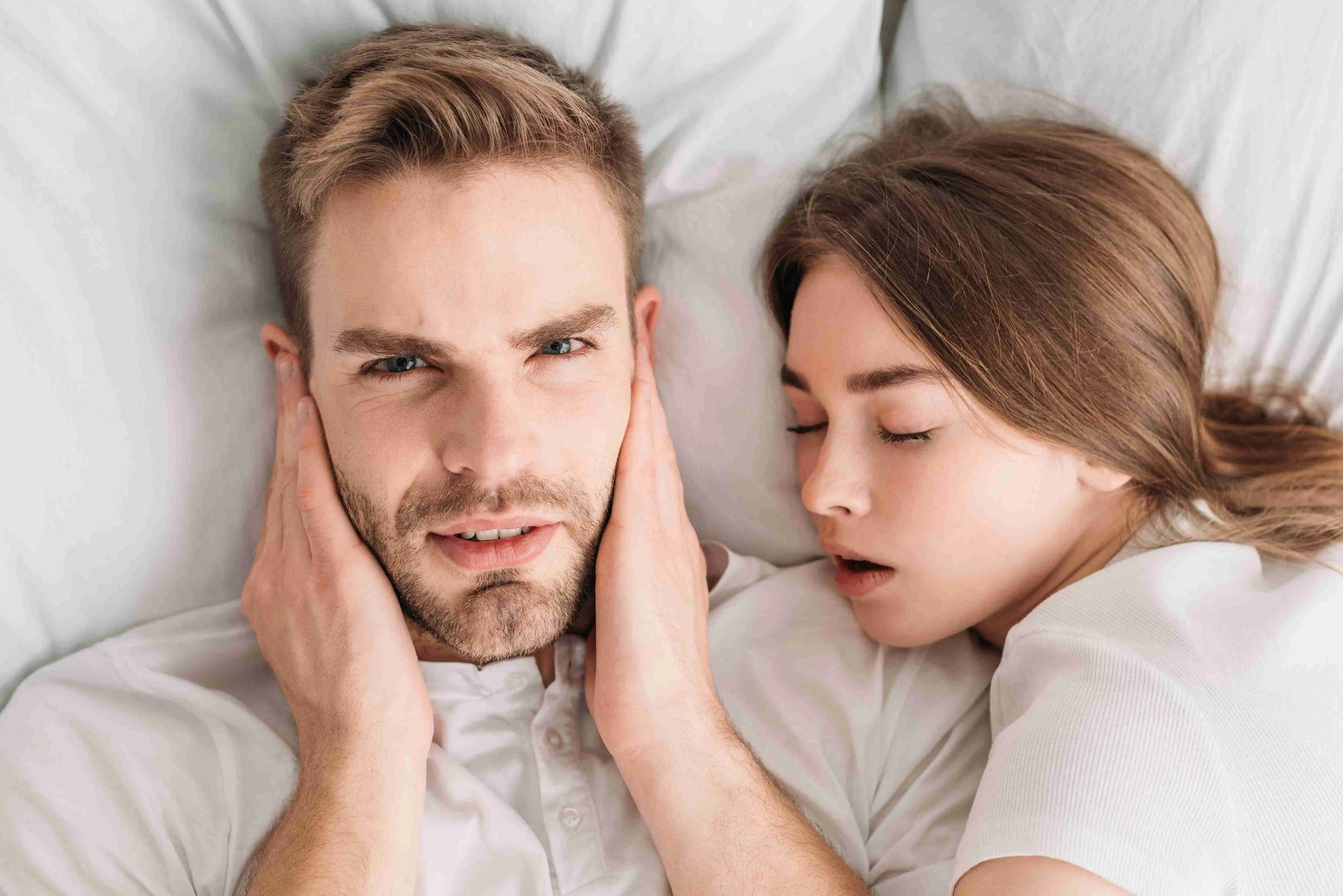Snoring, a common nighttime occurrence that affects millions of people worldwide, is a seemingly harmless sound that can be a sign of underlying health issues and can significantly impact both the snorer and their sleep partner.
In this article, we'll explore the symptoms, causes, consequences, and potential solutions for this widespread sleep disturbance, shedding light on why addressing snoring is crucial for overall health and well-being.
What is Snoring?
Snoring is a common sleep disorder characterized by a harsh, hoarse sound that occurs due to the vibration of the soft tissues in the upper airway during sleep.
Snoring occurs when the airway becomes partially obstructed, causing the soft tissues in the throat to vibrate as air passes through. This vibration produces a distinctive snoring sound, that can range from gentle whistling to loud, jarring noises.
While occasional snoring is generally harmless, chronic or persistent snoring can indicate an underlying health condition and may significantly impact the quality of sleep for both the snorer and their sleep partner.
One potential solution to alleviate this issue is choosing the right mattress, as it can help improve sleep posture and reduce airway obstruction. By supporting the body in optimal sleeping positions, these mattresses can contribute to a more restful night for everyone involved. Check out our Best Mattresses of 2024 for Snoring.
Anatomy of Snoring
The anatomy of the upper airway plays a crucial role in causing snoring. Several factors can contribute to the narrowing or obstruction of the airway, including:
- Nasal Congestion: Nasal congestion due to allergies, colds, or structural abnormalities can restrict airflow through the nasal passages, leading to increased air turbulence and snoring.
- Enlarged Tonsils or Adenoids: Enlarged tonsils or adenoids, often seen in children, can partially block the airway and cause snoring.
- Deviated Nasal Septum: A deviated nasal septum, which is a displacement of the bone and cartilage separating the nasal passages, can obstruct airflow and contribute to snoring.
- Elongated Soft Palate or Uvula: An elongated soft palate or uvula (the tissue hanging at the back of the throat) can vibrate more easily during breathing, resulting in snoring.
- Excess Throat Tissue: Excess tissue in the throat, often associated with obesity or aging, can narrow the airway and increase the likelihood of snoring.
What Causes Snoring

Snoring occurs when airflow through the nose and throat is partially blocked, causing the tissues to vibrate and produce sound. Several factors can contribute to this obstruction and lead to snoring:
Alcohol Consumption
Consuming alcohol, especially close to bedtime, can significantly increase the likelihood of snoring. Alcohol acts as a muscle relaxant, causing the tissues in the throat to become more flaccid. This relaxation can lead to increased vibration of these tissues as air passes through, resulting in the characteristic snoring sound.
Additionally, alcohol can suppress the brain's breathing control mechanisms, potentially exacerbating breathing issues during sleep.
Sleep Apnea
Sleep apnea is a serious sleep disorder that is often accompanied by loud snoring. In obstructive sleep apnea (OSA), the most common form, the airway becomes completely blocked during sleep, causing brief pauses in breathing.
These pauses are typically followed by gasping or choking sounds as the person struggles to resume breathing. The partial airway collapse that occurs between these episodes often results in heavy snoring.
Smoking
Smoking is a significant contributor to snoring. The irritants in tobacco smoke can cause inflammation and swelling of the upper airway tissues, narrowing the air passages. This narrowing increases the likelihood of tissue vibration during breathing, leading to snoring.
Smoking also damages the lungs and respiratory system over time, potentially exacerbating breathing difficulties during sleep.
Sedative Medications
Certain medications, particularly sedatives and muscle relaxants, can increase the likelihood of snoring. These drugs relax the muscles in the throat and tongue, potentially leading to partial airway obstruction during sleep.
Common examples include benzodiazepines and some antihistamines. It's important to discuss any concerns about medication-related snoring with a healthcare provider.
Sleep Position
The position in which a person sleeps can significantly impact their tendency to snore. Back sleeping (supine position) is most likely to induce snoring. In this position, gravity pulls the tongue and soft palate back towards the throat, potentially obstructing the airway.
Side sleeping is often recommended as a simple intervention to reduce snoring, as it helps keep the airway more open. Check out our recommendation for Best Mattresses for Side Sleepers.
These mattresses can enhance sleep posture and minimize airway blockage. Promoting proper body alignment during sleep can lead to a more peaceful and restful night for both the snorer and their partner.
Obesity
Excess body weight, particularly around the neck and throat area, is a major risk factor for snoring. Fat deposits in the upper airway can narrow the breathing passages, increasing the likelihood of tissue vibration during sleep.
Additionally, excess weight in the abdomen can put pressure on the diaphragm, affecting breathing patterns and potentially contributing to sleep-disordered breathing, including snoring.
Symptoms of Snoring

Snoring is a common sleep-related issue that can affect both the snorer and their sleep partner. While the most obvious reason for snoring is the characteristic sound produced during sleep, several other indicators may suggest a person is dealing with snoring:
Loud Breathing Sounds
The most obvious symptom of snoring is the characteristic loud, harsh breathing sounds during sleep. These noises occur when airflow is partially obstructed in the upper airway, causing the surrounding tissues to vibrate.
The volume can range from soft to extremely loud, potentially disturbing the sleep of both the snorer and their bed partner.
Dry Mouth or Sore Throat Upon Waking
Snorers often wake up with a dry mouth or sore throat. This is because snoring typically involves breathing through the mouth, which can lead to dehydration of the oral and throat tissues. The constant airflow and vibration can also irritate the throat, resulting in discomfort or soreness in the morning.
Morning Headaches
Frequent morning headaches can be a symptom of snoring, especially if it's related to sleep apnea. These headaches are often caused by reduced oxygen levels in the blood due to interrupted breathing during sleep. They typically subside within a few hours of waking but can significantly impact morning alertness and mood.
Daytime Fatigue
Snoring, particularly when associated with sleep apnea, can lead to poor sleep quality and daytime fatigue. Even if the snorer doesn't fully wake up, the noise and potential breathing interruptions can prevent them from reaching or maintaining deeper, restorative stages of sleep. This results in feeling tired, sluggish, or sleepy during the day.
Restless Sleep
Snorers often experience restless sleep, characterized by frequent tossing and turning throughout the night. This restlessness can be due to the body's attempts to reposition itself to improve airflow. Bed partners might notice this increased movement, which can also contribute to the snorer feeling unrefreshed in the morning.
Gasping or Choking During Sleep
In some cases, particularly with sleep apnea, snoring may be accompanied by episodes of gasping or choking during sleep. These occur when the airway becomes completely blocked, causing a brief arousal as the body struggles to resume normal breathing. While the snorer may not be aware of these episodes, they can be alarming for bed partners to witness.
Difficulty Concentrating
The poor sleep quality associated with snoring can lead to difficulty concentrating during waking hours. This can manifest as problems with focus, memory, and decision-making. Over time, chronic sleep deprivation due to snoring can significantly impact cognitive function and work performance.
Mood Changes
Snoring-induced sleep disruption can result in irritability and mood changes. The lack of quality sleep can leave individuals feeling short-tempered, anxious, or depressed. These mood alterations can affect personal relationships and overall quality of life.
High Blood Pressure
Chronic snoring, especially when linked to sleep apnea, can contribute to high blood pressure. The repeated drops in blood oxygen levels and the stress of frequent sleep disruptions can strain the cardiovascular system, potentially leading to hypertension over time.
Chest Pain
Some snorers may experience chest pain or discomfort at night. This can be due to the increased effort required to breathe against a partially obstructed airway.
In severe cases, it might also be related to the cardiovascular stress associated with sleep apnea. Any persistent chest pain should be evaluated by a healthcare professional to rule out serious conditions.
How Snoring Affects Sleep Quality
Snoring can significantly impact the quality of sleep for both the snorer and their sleep partner, leading to a range of negative consequences.
Impact on the Snorer
For the snorer, the effects of snoring can include:
- Fragmented Sleep: Snoring often leads to fragmented sleep patterns for the snorer. Throughout the night, the loud breathing noises can cause micro-awakenings, even if the person doesn't fully regain consciousness.
- Increased Risk of Sleep Disorders: Chronic snoring is often associated with a higher likelihood of developing more serious sleep disorders, particularly obstructive sleep apnea (OSA). In OSA, the airway becomes repeatedly blocked during sleep, causing pauses in breathing.
Impact on Sleep Partners
For the sleep partner, the effects of snoring can be equally detrimental:
- Sleep Disruption: For the sleep partner, the constant noise of snoring can make falling asleep and staying asleep extremely challenging. The unpredictable and often loud nature of snoring can startle the partner awake multiple times throughout the night.
- Relationship Strain: The impact of snoring on relationships should not be underestimated. Chronic sleep disturbances due to a partner's snoring can create significant tension and frustration within the relationship.
- Increased Stress and Anxiety: Living with a snoring partner can lead to heightened levels of stress and anxiety. The anticipation of another night of disrupted sleep can cause bedtime anxiety, making it even more difficult to fall asleep.
Lifestyle Changes to Reduce Snoring
In many cases, making simple lifestyle changes can act as snoring treatment and help alleviate or reduce the frequency and severity of snoring. These changes include:
Weight Management
Maintaining a healthy weight is crucial in reducing snoring. Excess weight, especially around the neck and throat area, can put pressure on the upper airway, narrowing the breathing passages. This narrowing increases the likelihood of tissue vibration during sleep, resulting in snoring.
By losing weight, individuals can decrease the amount of tissue in the throat that may be contributing to snoring.
Avoiding Alcohol and Smoking
Both alcohol consumption and smoking can significantly contribute to snoring. Alcohol, especially when consumed close to bedtime, relaxes the muscles in the throat, increasing the likelihood of airway obstruction and snoring.
Similarly, smoking irritates the lining of the nasal cavity and throat, leading to inflammation and increased mucus production, which can obstruct airflow and contribute to snoring.
Herbal Solutions
Some individuals find snoring remedies through herbal remedies, although scientific evidence for their effectiveness is limited. Peppermint oil, for instance, is believed to have anti-inflammatory properties that may help reduce swelling in the lining of the nostrils and throat, potentially easing breathing. Eucalyptus oil is another popular option, known for its ability to clear nasal passages.
Regular Exercise and Healthy Diet
Incorporating regular exercise into one's routine can help reduce snoring in several ways. Physical activity can help with weight management, improve muscle tone (including in the throat area), and promote better overall sleep quality.
Additionally, maintaining healthy nutrition rich in anti-inflammatory foods may help reduce swelling in the airways. Foods high in omega-3 fatty acids, such as fish, nuts, and seeds, are particularly beneficial.
Hydration is also important, as dehydration can cause mucus in the mouth and throat to become stickier, potentially exacerbating snoring.
Medical Treatments for Snoring
In cases where lifestyle changes are insufficient or where snoring is caused by an underlying medical condition, your healthcare provider may recommend various medical treatments to address the issue.
Continuous Positive Airway Pressure (CPAP)
Continuous Positive Airway Pressure (CPAP) therapy is a common and effective treatment for obstructive sleep apnea (OSA), which often involves snoring. CPAP machines deliver a steady stream of air through a mask worn during sleep, keeping the airway open and preventing obstructions that lead to snoring and breathing disruptions.
Oral Appliances
Dentists specializing in sleep medicine can create custom-fitted oral appliances. These devices, similar to mouthguards, are designed to reposition the lower jaw and tongue, keeping the airway more open during sleep.
They're particularly effective for mild to moderate sleep apnea and snoring caused by jaw positioning issues.
Surgical Interventions
In some cases, surgical procedures may be recommended:
- Uvulopalatopharyngoplasty (UPPP): This surgery removes excess tissue in the throat to widen the airway. It may include removal of the uvula, soft palate, tonsils, and adenoids.
- Laser-Assisted Uvulopalatoplasty (LAUP): A less invasive procedure that uses laser technology to reshape the soft palate and uvula.
- Pillar Procedure: Involves inserting small implants into the soft palate to stiffen it, reducing vibration and snoring.
- Septoplasty: Corrects a deviated septum, which can contribute to snoring by obstructing nasal airflow.
Radiofrequency Ablation
This minimally invasive procedure uses radiofrequency energy to shrink and stiffen the soft palate and base of the tongue. It's performed under local anesthesia and can be effective for mild to moderate snoring.
Palatal Implants
Small implants are inserted into the soft palate to stiffen it, reducing the vibrations that cause snoring. This procedure is less invasive than traditional surgery and can be performed in an outpatient setting.
Medication
While there's no specific medication to treat snoring directly, certain medications can help manage underlying conditions that contribute to snoring, like nasal corticosteroid sprays to reduce inflammation in nasal passages, allergy medications to alleviate nasal congestion, and decongestants for short-term relief of nasal stuffiness.
FAQs
Is snoring dangerous?
While snoring itself is not necessarily harmful, it can be a symptom of an underlying health condition, such as obstructive sleep apnea (OSA), which can have serious health implications if left untreated. Additionally, chronic snoring can disrupt the sleep quality of both the snorer and their sleep partner, leading to fatigue, irritability, and decreased productivity.
Can snoring be cured?
While there is no single cure for snoring, various treatments and lifestyle changes can help alleviate or reduce its severity. The most effective approach depends on the underlying cause of snoring, which may require medical intervention, lifestyle modifications, or a combination of both.
Why do people snore?
Snoring is more common in men than women, particularly after middle age. This is partly due to the anatomical differences in the upper airway and the effects of hormones on muscle tone and fat distribution.
Can children snore?
Yes, children can snore, and it frequently results from enlarged tonsils or adenoids, nasal congestion, or other anatomical issues. Chronic snoring in children should be evaluated by a healthcare professional, as it can be a sign of obstructive sleep apnea (OSA) or other underlying conditions.
Can snoring be prevented?
While snoring cannot be completely prevented in all cases, there are several preventive measures that can help reduce the risk or severity of snoring. These include maintaining a healthy weight, avoiding alcohol and smoking, and practicing good sleep habits.
What makes snoring worse?
Snoring worsens due to factors like sleeping on your back, which causes airway obstruction, and excess weight, which increases pressure on the throat. Alcohol, smoking, and sedative use relax throat muscles, making snoring more likely. Nasal congestion and sleep deprivation also contribute to more frequent and louder snoring.
Conclusion
Snoring is a complex issue that can have far-reaching effects on health, relationships, and quality of life. By understanding the causes and implications of snoring, individuals can take proactive steps to address it. Whether through lifestyle changes, medical interventions, or a combination of both can lead to better sleep.
Karen Barnard
Karen is a Human Movement Science expert and a certified sports nutrition and massage therapist. At Sleepiverse, she combines her passion for human movement science and sleep health to educate herself and her readers about healthier sleep. In addition to writing articles, Karen manages a fitness studio offering private training, athletic conditioning, and sports massage therapy. She focuses on providing people with a holistic environment for people to reach their health goals, often incorporating stretch therapy to promote mental tranquillity and help people improve their sleep.


